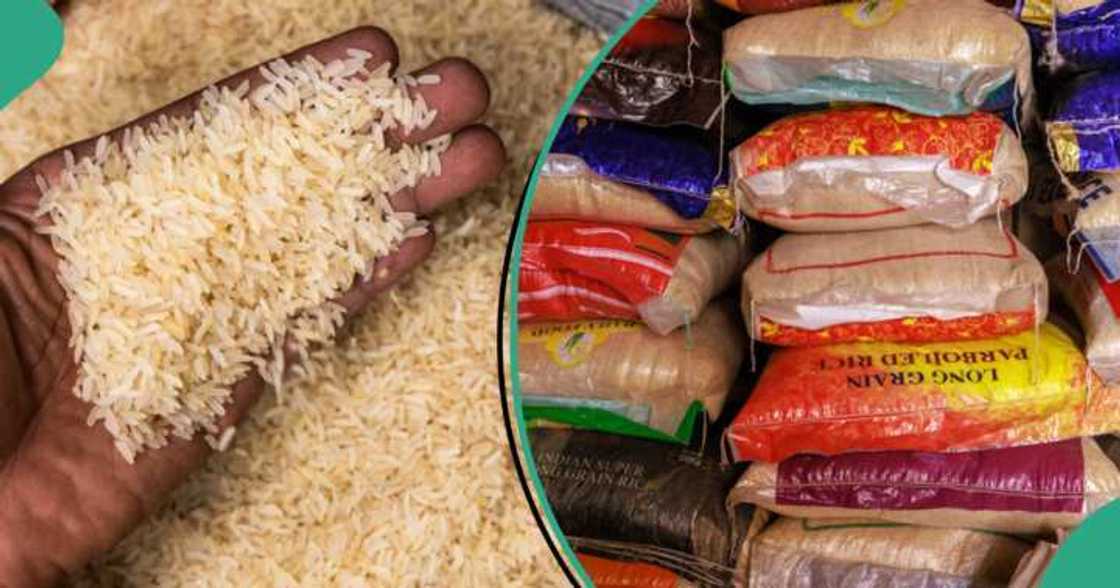New Prices Emerge as Nigerian Farmers Dump Rice Production, Imports Crush Profits
- Local rice farmers are abandoning cultivating the staple in favour of more profit-oriented crops
- The farmers say that government policy on rice imports is stifling profit and making paddy rice farming difficult
- Additionally, the recent price crash, which the farmers blamed on import policy, has made rice production challenging
Legit.ng’s Pascal Oparada has reported on tech, energy, stocks, investment and the economy for over a decade.
Nigerian rice farmers are abandoning paddy fields in droves, driven out by a surge in global supply.
A glut from major Asian producers, notably India, has sent international prices crashing, making it impossible for local farms to compete.

Source: Getty Images
Farmers switch to profit‑friendly crops
Compounding the market pressure is Nigeria’s liberal rice import policy.
Recent customs reforms have removed tariffs, enabling Nigeria to import nearly 61,000 tonnes of rice, its highest volume in 10 years.
The flood of cheap foreign rice into domestic markets has forced local prices well below breakeven levels for farmers.
Smallholder rice producers are increasingly pivoting to other crops offering better returns.
Many now favour maize, cassava, and other staples where local prices remain more stable and margins are sustainable.
Local millers and processors confirm the economic fallout: rice bags once sold at upwards of ₦90,000 now trade at ₦67,000 or less, a 28% drop since January.
For accountants running the numbers, continuing rice cultivation has become unviable without subsidies or protective policy reforms.
Food security at risk
While consumers welcome lower rice prices, analysts warn of long-term risks.
Reduced domestic production undermines Nigeria’s food sovereignty and exposes the population to future shocks if import channels are disrupted.
According to a BusinessDay report, experts argue that insufficient policy planning allowed the oversupply situation.
With tariffs removed and no safeguards for local producers, Nigeria ceded market share to foreign players, despite domestic capacity.
Agricultural associations are urging federal intervention. FACAN chairman Victor Iyama called for protective tariffs or support programmes, stressing that Nigeria should rely more on ramping up local cultivation than foreign dumping.
Rising imports, declining production
USDA figures show Nigerian rice production slipped 7 per cent to 5.23 million tonnes in 2024/25, from 5.61 million tonnes the previous year.
With the country importing over 43% of its rice needs, the dependency on global supply is deepening.
Market watchers expect rice prices to fall further in 2025/26, following favourable harvest forecasts in India and other major producers.
A commodity report from AFEX predicts up to an 11% price drop, even as global demand remains muted.
The road to revival
Restoring balance in Nigeria’s rice sector may require multiple actions: reintroducing targeted import tariffs, providing input support for farmers, investing in local supply chains, and boosting productivity.

Source: Getty Images
Without these reforms, the current glut-driven collapse may signal the end of domestic rice viability.
Dealers increase prices for a 50kg bag of rice
Legit.ng earlier reported that the price of a 50kg bag of rice has surged across major Nigerian markets, with traders now quoting between N77,000 and N100,000.
The latest price is an increase from an average price of N65,000 quoted six months ago.
A market survey revealed that short-grain rice now sells for N77,000 to N85,000, while long-grain varieties are priced as high as N100,000 in markets such as Daleko and Mile 12 in Lagos.
Proofreading by James Ojo, copy editor at Legit.ng.
Source: Legit.ng





